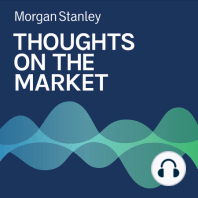3 min listen
Commercial Real Estate's Uncertain Future
ratings:
Length:
4 minutes
Released:
Feb 16, 2024
Format:
Podcast episode
Description
Our Fixed Income Strategist outlines commercial real estate’s post-pandemic challenges, which could make regional bank lenders vulnerable. ----- Transcript -----Welcome to Thoughts on the Market, I’m Vishy Tirupattur, Morgan Stanley’s Chief Fixed Income Strategist. Along with my colleagues bringing you a variety of perspectives, I'll be talking about the challenges of the commercial real estate markets. It's Friday, Feb 16th at 3 pm in New York.Commercial real estate – CRE in short – is back in the spotlight in the aftermath of the loan losses and dividend cuts announced by New York Community Bancorp. Lenders and investors in Japan, Germany, and Canada have also reported sizable credit losses or write-downs related to US commercial real estate. The challenges in CRE have been on a slow burn for several quarters. In our view, the CRE issues should be scrutinized through the lenses of both lenders and property types. We see meaningful challenges in both of them.From the lenders’ perspective, we now estimate that about a trillion and a half of commercial real estate debt matures by the end of 2025 and needs to be refinanced; about half of this sits on bank balance sheets.The regulatory landscape for regional banks is changing dramatically. While the timeline for implementing these changes is not finalized, the proposed changes could raise the cost of regional bank liabilities and limit their ability to deploy capital; thereby pressuring margins and profitability. This suggests that the largest commercial real estate lender – the regional banking sector – might be the most vulnerable.Office as a property type is confronting a secular challenge. The pandemic brought meaningful changes to workplace practice. Hybrid work has now evolved into the norm, with most workers coming into the office only a few days a week, even as other outdoor activities such as air travel or dining out have returned to their pre-Covid patterns. This means that property valuations, leasing arrangements, and financing structures must adjust to the post-pandemic realities of office work. This shift has already begun and there is more to come.It goes without saying, therefore, that regional banks with office predominant in their CRE exposures will face even more challenges.Where do we go from here? Property valuations will take time to adjust to shifts in demand, and repurposing office properties for other uses is far from straightforward. Upgrading older buildings turns out to be expensive, especially in the context of energy efficiency improvements that both tenants and authorities now demand. The bottom line is that the CRE challenges should persist, and a quick resolution is very unlikely.Is it systemic? We get this question a lot. Whether or not CRE challenge escalates to a broader system-wide stress depends really on one’s definition of what systemic risk is. In our view, this risk is unlikely to be systemic along the lines of the global financial crisis of 2008. That said, strong linkages between the regional banks and CRE may impair these banks’ ability to lend to households and small businesses. This, in turn, could lead to lower credit formation, with the potential to weigh on economic growth over the longer term.Thanks for listening. If you enjoy the show, please leave us a review on Apple Podcasts and share Thoughts on the Market with a friend or colleague today.
Released:
Feb 16, 2024
Format:
Podcast episode
Titles in the series (100)
Mike Wilson: Are U.S. Economic Indicators Flashing Yellow? by Thoughts on the Market
